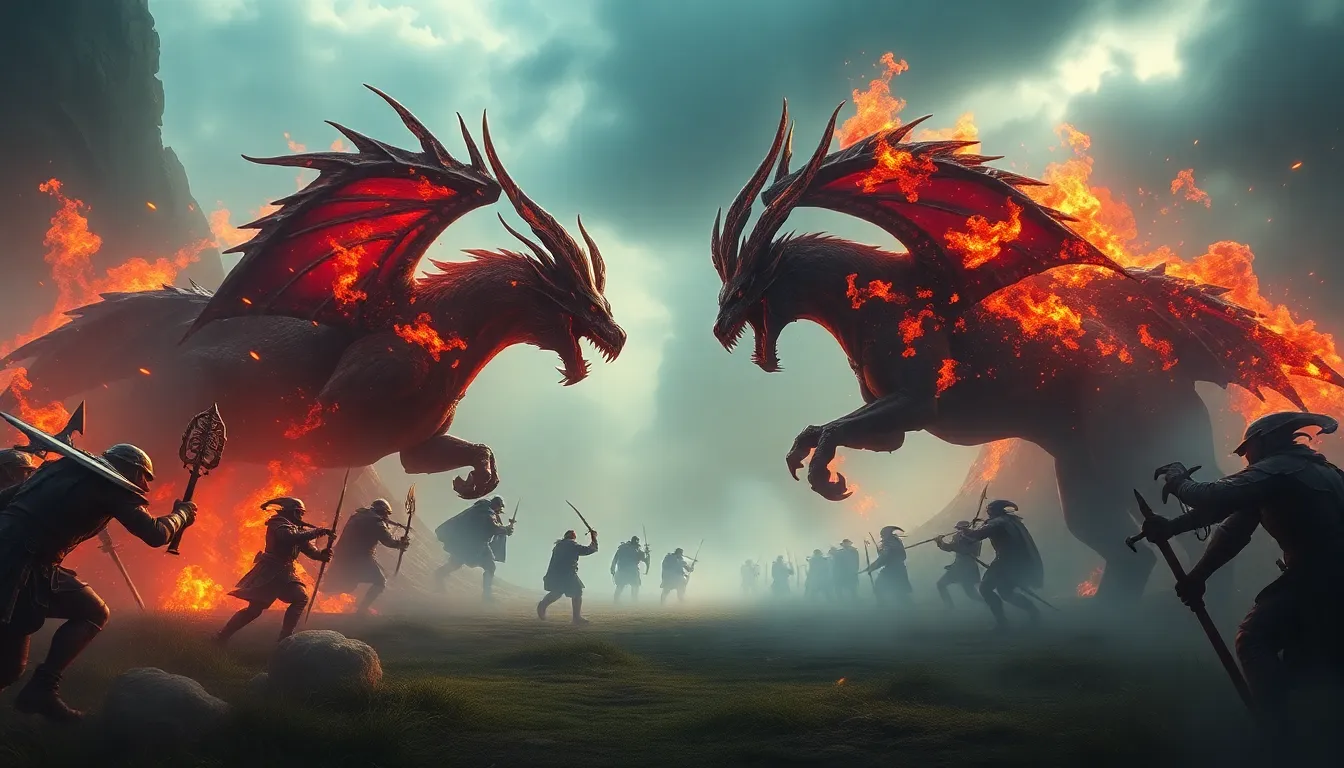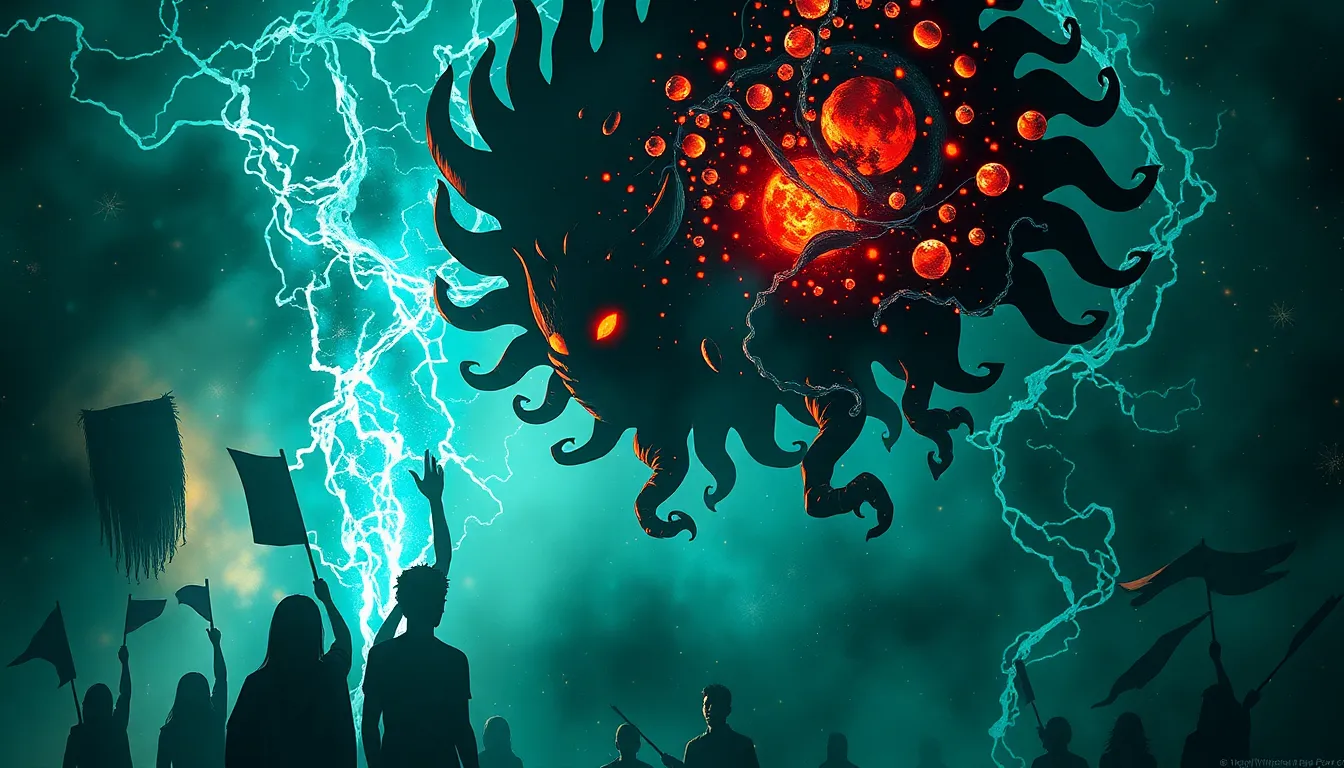The Mythical Battlefield: Epic Showdowns of the Ages
I. Introduction
The concept of mythical battlefields has captivated human imagination for centuries. These are not just mere locations; they are the backdrop for epic confrontations that define heroes, villains, and the very essence of good versus evil. Mythical battlefields serve as a testament to humanity’s desire for conflict resolution and the quest for glory.
Epic showdowns play a crucial role in cultural narratives, offering insight into moral values, societal structures, and the human condition. This article will explore the historical context of mythical battles, delve into legendary warriors and their conflicts, highlight iconic locations, and analyze the influence of these narratives on literature and art. Furthermore, we will examine the psychological aspects of these battles, compare myths across cultures, and discuss the legacy of these tales in modern society.
II. The Historical Context of Mythical Battles
A. Origins of Mythical Warfare in Ancient Civilizations
The origins of mythical warfare can be traced back to ancient civilizations where the lines between history and mythology often blurred. From the epic tales of Mesopotamia to the rich narratives of the Greeks and Romans, battles were not just events but stories that reflected the beliefs and values of the time.
B. The Role of Mythology in Shaping Battle Narratives
Mythology has played a pivotal role in framing the narratives surrounding these legendary confrontations. Gods, demigods, and supernatural beings often intervened in the affairs of mortals, creating layers of complexity in battle stories that transcended mere physical conflict.
C. Evolution of Battle Legends Through the Ages
As societies evolved, so did the legends surrounding battles. Oral traditions gave way to written texts, and the characters in these stories began to embody the ideals of their respective cultures. This evolution is evident in the transformation of battle heroes from ancient warriors to modern-day figures of myth.
III. Legendary Warriors and Their Fabled Conflicts
A. Hercules vs. the Hydra: Strength Against Monsters
One of the most iconic mythical battles is between Hercules and the Hydra. Hercules, a symbol of brute strength and determination, faced the multi-headed serpent with cunning and resilience. Each time he cut off one of its heads, two more would grow back. This battle represents the struggle against insurmountable odds and the importance of strategy in overcoming challenges.
B. King Arthur and the Knights: Chivalry in Battle
King Arthur and his knights of the Round Table epitomize the ideals of chivalry and honor in warfare. Their battles against various foes, including the infamous Mordred, highlight themes of loyalty, bravery, and the quest for justice. Arthur’s legendary sword, Excalibur, symbolizes rightful sovereignty and the burdens of leadership.
C. Beowulf and Grendel: The Clash of Good vs. Evil
The tale of Beowulf’s battle against Grendel is a quintessential representation of the fight between good and evil. Beowulf, the hero, embodies courage, while Grendel represents chaos and malevolence. This epic conflict resonates with the timeless struggle of humanity against darkness.
IV. Iconic Mythical Locations and Their Significance
A. The Fields of Elysium: The Paradise of Heroes
The Fields of Elysium, in Greek mythology, serve as a serene paradise for heroes who have earned their place after death. It symbolizes the ultimate reward for bravery and valor in battle, embodying the notion of a peaceful afterlife.
B. Valhalla: The Hall of the Slain
In Norse mythology, Valhalla is the grand hall where warriors who died gloriously in battle are received. This location reflects the valorization of martial prowess and the belief that death in battle is a path to immortality among the gods.
C. Mount Olympus: The Divine Arena for Gods
Mount Olympus, the home of the Greek gods, serves as a divine arena where mythical battles often take place. It symbolizes the intersection of divine will and human actions, showcasing how the gods influence the fates of heroes and their battles.
V. The Influence of Mythical Battles on Literature and Art
A. Depictions in Ancient Texts and Epics
Ancient texts such as Homer’s “Iliad” and “Odyssey” are prime examples of how mythical battles have been depicted in literature. These epics not only tell stories of war but also explore deep philosophical questions about fate, honor, and the human experience.
B. The Impact on Renaissance Art and Literature
The Renaissance period saw a resurgence of interest in classical mythology, influencing artists and writers alike. Paintings, sculptures, and literary works from this era often drew upon mythical battles to convey complex human emotions and ideals.
C. Modern Adaptations in Film and Pop Culture
Today, mythical battles continue to inspire modern storytelling, evident in films, video games, and literature. Characters like Thor and Wonder Woman embody the legacy of mythical warriors, showcasing their timeless appeal in contemporary culture.
VI. The Psychological Aspects of Mythical Showdowns
A. The Archetypes of Heroes and Villains
Mythical battles often feature archetypal characters, such as the noble hero and the malevolent villain. These archetypes resonate with audiences, enabling them to understand complex moral dilemmas through a familiar lens.
B. The Symbolism of Conflict in Mythology
The conflicts depicted in mythology symbolize deeper struggles within society and the individual. They reflect the societal values of their time, often serving as cautionary tales or moral lessons.
C. How Mythical Battles Reflect Human Nature and Society
Ultimately, mythical battles mirror the complexities of human nature and societal conflicts. They provide a framework for understanding the dualities of life, such as love and hate, courage and fear, and the eternal struggle for balance and justice.
VII. Comparative Analysis of Mythical Battles Across Cultures
A. Greek vs. Norse Mythological Showdowns
Comparing Greek and Norse mythological battles reveals intriguing contrasts. Greek mythology often emphasizes individual heroism and divine intervention, while Norse stories focus on fate and collective valor in battle.
B. Eastern vs. Western Perspectives on Warfare
Eastern and Western mythologies present different perspectives on warfare. Eastern stories, such as those from Hindu epics like the “Mahabharata,” often explore the moral complexities of conflict, while Western narratives tend to glorify heroic battles and valor.
C. Common Themes and Divergences in Global Mythology
Despite cultural differences, common themes such as the quest for honor, the battle against evil, and the search for identity can be found across global mythologies, highlighting our shared human experience.
VIII. The Role of Fate and Destiny in Epic Battles
A. The Concept of Fate in Mythology
The concept of fate is central to many mythical battles. Characters often grapple with predetermined destinies, raising questions about free will and the extent of human agency in their outcomes.
B. How Prophecies Shape the Outcomes of Battles
Prophecies frequently play a significant role in shaping the narratives of mythical battles. Characters may strive to fulfill or avoid their fates, leading to dramatic and often tragic outcomes.
C. The Influence of Gods and Supernatural Forces
The influence of gods and supernatural forces is a common element in mythical battles, where divine intervention can tilt the scales in favor of one side or another, emphasizing the unpredictable nature of fortune in warfare.
IX. The Legacy of Mythical Battles in Modern Society
A. Inspiring Real-World Military Strategies and Tactics
The strategies and tactics depicted in mythical battles have inspired real-world military leaders throughout history. The principles of courage, strategy, and sacrifice continue to resonate in military training and warfare.
B. The Use of Mythical Battles in Modern Storytelling
Mythical battles remain a popular motif in modern storytelling, serving as a basis for conflict in novels, films, and other forms of entertainment. They provide a rich tapestry for exploring themes of heroism, morality, and the human experience.
C. Lessons Learned from



